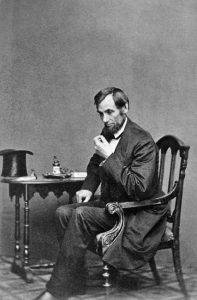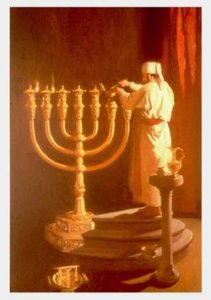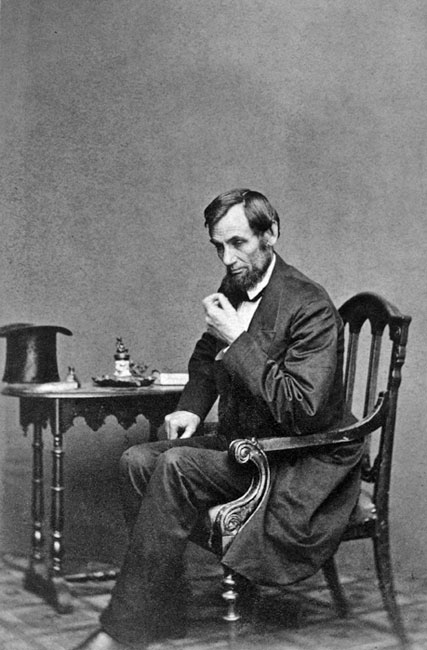
The Melancholy of Aharon and Lincoln – A Vort for Parshas B’Haaloscha
President Lincoln’s depression is one of the most interesting chapters of American history. Although it may not be taught in grade school, Lincoln’s friends, family, and political colleagues all knew of his “melancholy”. In our modern-day clinical terminology we would call it depression. However, it was this element of his character that historians credit with giving him the skill, insight, and vision to lead the United States through its most troubled period. In fact, modern scientific research has shown us that periods of depression in life can actually lead to more realistic evaluation of situations and better problem solving.
The very first Rashi in Parshas B’haaloscha presents us with another great leader feeling down. Rashi wonders why the lighting of the menorah at the beginning of the parsha immediately follows the korbanos of the tribal leaders. Based on the midrash, he answers with an incredible vignette. Aharon, the High Priest, had difficulty watching the incredible service performed by the tribal leaders. Chalsha az daaso, his mind became weak when he witnessed it, or as we would call it, “he started feeling down”. Aharon felt left out that he was not included as well. Although he was the High Priest, he was left out of one of the most defining moments of the dedication of the mishkan. Who could blame him for feeling bad? But Hashem comforts him, Chayecha! Shelcha gedolah mishelahem, By your life! Yours is greater than their’s – you will light the menorah.
 What exactly was Hashem’s answer to Aharon? Was it merely that he would get more exposure in the lighting of the menorah? The great Chasidic master, Rav Yitzchak Vorker (Emunas Etecha – B’haaloscha) explained that Rashi is saying something much deeper. Shelcha gedolah mishelahem, yours is greater than their’s, is not a reference to the lighting of the menorah. It is a reference to Aharon’s sadness – Your sadness is a greater than their service. He was saying to Aharon that his sadness at being left out and his longing to be included was a greater service in His eyes than any korban given by the tribal leaders. Aharon was being told that heartfelt melancholy is one of the greatest strengths a Jew can have. Rav Yitchak Vorker explains that this is why Aharon was given the honor of kindling the Menorah. Only someone that understands the darkness of sadness can truly light up the world with Divine Light. Like with President Lincoln, the depression is what leads to the greatest salvation there is.
What exactly was Hashem’s answer to Aharon? Was it merely that he would get more exposure in the lighting of the menorah? The great Chasidic master, Rav Yitzchak Vorker (Emunas Etecha – B’haaloscha) explained that Rashi is saying something much deeper. Shelcha gedolah mishelahem, yours is greater than their’s, is not a reference to the lighting of the menorah. It is a reference to Aharon’s sadness – Your sadness is a greater than their service. He was saying to Aharon that his sadness at being left out and his longing to be included was a greater service in His eyes than any korban given by the tribal leaders. Aharon was being told that heartfelt melancholy is one of the greatest strengths a Jew can have. Rav Yitchak Vorker explains that this is why Aharon was given the honor of kindling the Menorah. Only someone that understands the darkness of sadness can truly light up the world with Divine Light. Like with President Lincoln, the depression is what leads to the greatest salvation there is.
Very often we have difficult periods in our lives. These challenges may be different than Lincoln’s, but they are be trials that we truly never forget. At these times we may react with chalishus hadaas, a sense of feeling down and depressed. We often view those periods in a negative light and seek any means to escape the difficulty of the emotions they present us with. Rav Yitzchak Vorker teaches us an incredible lesson. It is at those very moments of struggle that we are special in Hashem’s eyes. Yours is greater than their’s. Hashem looks at a person who struggles with hardship much like He viewed Aharon – with admiration and love. We need not hide from those times or the memories we have of them. These periods are our finest moments as people. They are the times that define us as ovdei hashem, as servants of Hashem like the kohanim. An incredible reward awaits those that see the beauty in those times of difficulty. Like Aharon, a time of incredible light will follow when we kindle our own personal Menorah. Our strength, courage, and example will then shine and serve as an inspiration to all.

